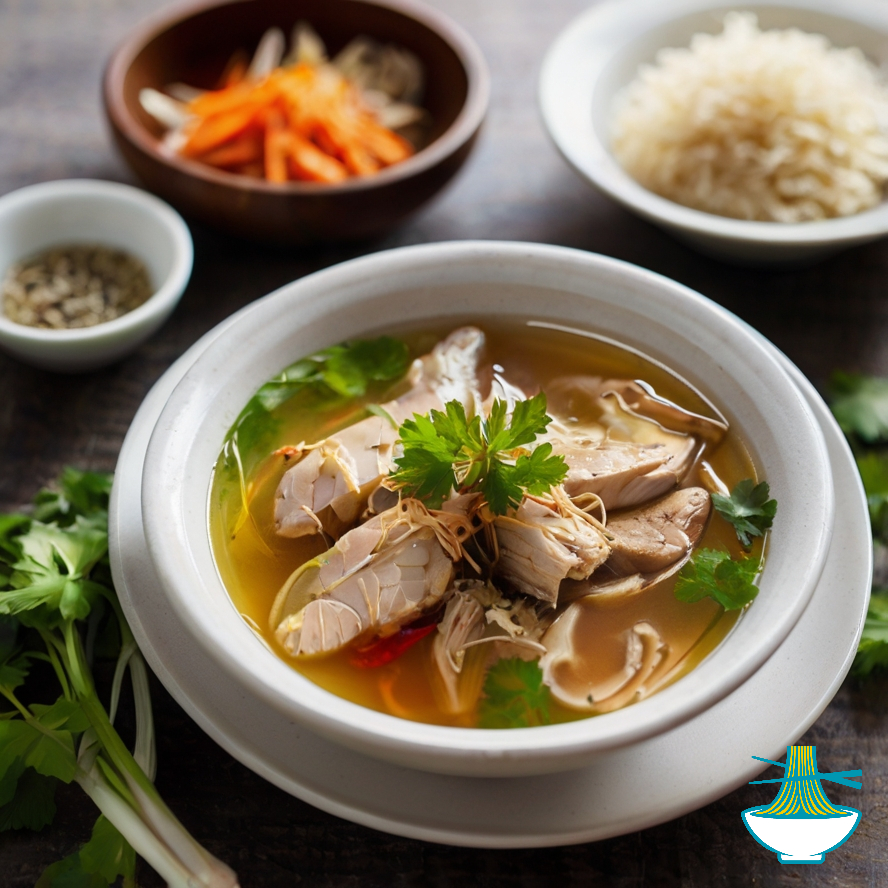Ga Tan is a traditional Vietnamese herbal chicken soup known for its medicinal properties and rich flavors. The dish originated in Vietnam, where it has been enjoyed for centuries as a nourishing and healing soup. The recipe typically includes chicken pieces, aromatic herbs such as ginger and lemongrass, and a blend of medicinal herbs and spices like goji berries, jujubes, and astragalus root. These ingredients are simmered together to create a flavorful broth that is believed to boost immunity and promote overall well-being. Ga Tan is often served during special occasions or as a comforting meal during cold weather, valued not just for its taste but also for its health benefits in Vietnamese culinary culture.
Ingredients:
- 1 whole chicken, cut into pieces
- 2 inches of ginger, sliced
- 2 stalks of lemongrass, smashed
- 4-5 dried goji berries
- 4-5 dried jujubes (red dates) :Goji berries are a type of dried fruit
- 1 tablespoon dried astragalus root (optional)
- Salt to taste
Method of Preparation:
1. Rinse the chicken pieces under cold water and pat them dry with paper towels.
2. In a large pot, add the chicken pieces, ginger slices, smashed lemongrass, goji berries, jujubes, and dried astragalus root (if using).
3. Fill the pot with enough water to cover all the ingredients.
4. Bring the water to a boil over medium-high heat, then reduce the heat to low and let the soup simmer gently for about 1.5 to 2 hours, or until the chicken is tender and cooked through.
5. Skim off any foam or impurities that rise to the surface during cooking.
6. Season the soup with salt to taste, and adjust the seasoning if needed.
7. Serve the Ga Tan hot, garnished with fresh herbs like cilantro or Vietnamese mint if desired.
Nutrition Value:
1. Whole Chicken (cut into pieces)
- Calories: Approximately 165 calories per 100 grams (varies based on cooking method and cuts).
- Protein: High in protein, providing about 31 grams per 100 grams of cooked chicken.
- Fat: Contains varying amounts of fat depending on the cut and cooking method. Skinless chicken breast has lower fat content compared to thighs or drumsticks.
- Sodium and Cholesterol: Sodium and cholesterol content can vary based on preparation, with skinless and baked/grilled options being lower in sodium and cholesterol.
- Vitamins and Minerals: Rich in B vitamins (especially niacin and B6), phosphorus, and selenium. Also contains smaller amounts of vitamin A, vitamin C, calcium, and iron.
- Nutritional Benefits: Chicken is a good source of lean protein, essential for muscle growth and repair. It also provides important nutrients for overall health, such as niacin for energy production and selenium for antioxidant function.
2. Ginger (sliced)
- Calories: Approximately 80 calories per 100 grams.
- Carbohydrates: About 18 grams per 100 grams.
- Protein and Fat: Negligible amounts.
- Sodium and Cholesterol: Very low.
- Vitamins and Minerals: High in vitamin C, vitamin B6, potassium, and magnesium. Also contains manganese and small amounts of other vitamins.
- Nutritional Benefits: Ginger has anti-inflammatory and antioxidant properties. It may help with digestion, nausea, and cold symptoms. It's also rich in bioactive compounds beneficial for overall health.
3. Lemongrass (smashed)
- Calories: Very low, around 99 calories per 100 grams.
- Carbohydrates: About 25 grams per 100 grams.
- Protein, Fat, Sodium, and Cholesterol: Negligible amounts.
- Vitamins and Minerals: Contains vitamin C, vitamin B6, folate, potassium, magnesium, and iron.
- Nutritional Benefits: Lemongrass is known for its aromatic flavor and is used in herbal medicine for its potential antibacterial and anti-inflammatory properties. It may also support digestion and immune health.
4. Dried Goji Berries
- Calories: Approximately 349 calories per 100 grams.
- Carbohydrates: High, around 77 grams per 100 grams.
- Protein and Fat: Moderate amounts.
- Sodium and Cholesterol: Very low.
- Vitamins and Minerals: Rich in vitamin C, vitamin A, iron, and antioxidants like zeaxanthin and beta-carotene.
- Nutritional Benefits: Goji berries are considered a superfood due to their high antioxidant content, which may promote eye health, boost immunity, and support skin health.
5. Dried Jujubes (Red Dates)
- Calories: About 283 calories per 100 grams.
- Carbohydrates: High, approximately 69 grams per 100 grams.
- Protein and Fat: Low amounts.
- Sodium and Cholesterol: Very low.
- Vitamins and Minerals: Good source of vitamin C, vitamin A, potassium, and iron.
- Nutritional Benefits: Jujubes are known for their natural sweetness and are rich in antioxidants. They may support digestive health, boost immunity, and provide energy.
6. Dried Astragalus Root (Optional)
- Calories: Approximately 56 calories per 100 grams.
- Carbohydrates: About 14 grams per 100 grams.
- Protein, Fat, Sodium, and Cholesterol: Negligible amounts.
- Vitamins and Minerals: Contains small amounts of calcium, potassium, magnesium, and zinc.
- Nutritional Benefits: Astragalus root is used in traditional Chinese medicine for its potential immune-boosting properties. It's also believed to have anti-inflammatory effects and may support heart health.
7. Salt
- Calories: None (provides flavor but no energy).
- Sodium: High, but consumption should be moderated for optimal health.
- Nutritional Benefits: Salt is essential for flavoring food and maintaining electrolyte balance in the body. However, excessive salt intake can contribute to high blood pressure and other health issues, so it should be used in moderation.


Comments